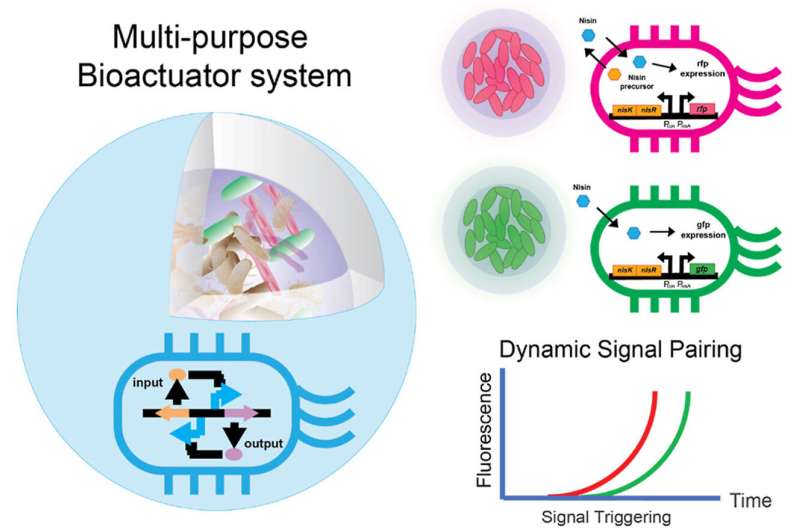Developing alginate hydrogels that can support cell growth

Encapsulating cells—both prokaryotic and eukaryotic—allows researchers to carry out experiments in hydrated environments over prolonged periods of time. However, cell growth under these conditions can exert a lot of pressure on the encapsulating shells, resulting in cell leakage. In a new study, researchers at the University of Illinois Urbana-Champaign have developed modified alginate hydrogels that can endure the growth of bacteria, allowing them to synthesize important enzymes.
Hydrogels are polymers that are reinforced by different chemical bonds, and are capable of absorbing water and swelling without breaking down. As a result, biotechnology researchers have often turned to these structures to provide stability and structural support for their cell cultures.
"Hydrogel capsules have been utilized for over 50 years. There are many different types that can be made by combining different kinds of cells in different hydrogel environments," said Yoon Jeong, a graduate student in the Irudayaraj (CGD/EIRH) lab. "The problem with combining microorganisms with hydrogel capsules is that they leak out."
To address this problem, Jeong decided to focus on alginate, a naturally occurring, edible compound found in brown algae. Although it has been previously looked at, using it to encapsulate bacteria has been challenging.
"My strategy was to make a hydrogel membrane on the surface of the hydrogel structure," Jeong said. Although the change may seem small, it works well. Jeong tested his system with genetically-modified Lactococcus lactis and saw that without the layer, the bacteria leaked out and were unable to form biofilms—a collection of microorganisms that stick to each other. On the other hand, L. lactis colonies inside the modified hydrogels were able to grow for over 10 days; the hydrogels provided a stable platform that did not rupture.
Jeong also looked genetically-modified Escherichia coli, which can synthesize a host of different molecules, only when they are able to achieve a high cell density. He looked at E. coli cells that can produce green fluorescent protein, which emits a green signal when the cells are subjected to ultraviolet light. "Although growing GFP-producing E. coli is simple, they quickly die," Jeong said. "I showed that inside the hydrogel they form colonies, which continuously increase in size, produce GFP, and do not leak out."
He achieved the same results when he used E. coli cells that are bioluminescent. These bacteria encode the lux genes that result in blue cells that glow in the dark. The researchers saw that once the bacteria reached a certain cell density, the luminescence continued to increase for the next 3 days.
The main purpose of making these hydrogels is to develop bioreactors that can support the growth of bacteria while they make important compounds. To test whether the modified hydrogels were capable of sustaining such processes, Jeong also tested the ability of L. lactis to make nisin, a peptide that is used as a food preservative. In agreement with their previous results, the bacteria were able to grow well in the modified hydrogels and were able to produce the compound.
"Although at a glance it can seem simple to make these hydrogel structures, it is actually difficult. You have to control their size, thickness, and prevent agglomeration since these capsules stick together," Jeong said. "Researchers who have a different scientific background have found this process difficult. We plan to publish a detailed protocol soon so that people can use this cheap and easy technique."
The researchers are also interested in continuing their tests in human and cancer cells, with the hope that the hydrogels will be able to provide a reliable platform for a wide range of applications.
The study was published in Biosensors and Bioelectronics.
More information: Yoon Jeong et al, Soft hydrogel-shell confinement systems as bacteria-based bioactuators and biosensors, Biosensors and Bioelectronics (2022). DOI: 10.1016/j.bios.2022.114809
Journal information: Biosensors and Bioelectronics
Provided by University of Illinois at Urbana-Champaign





















